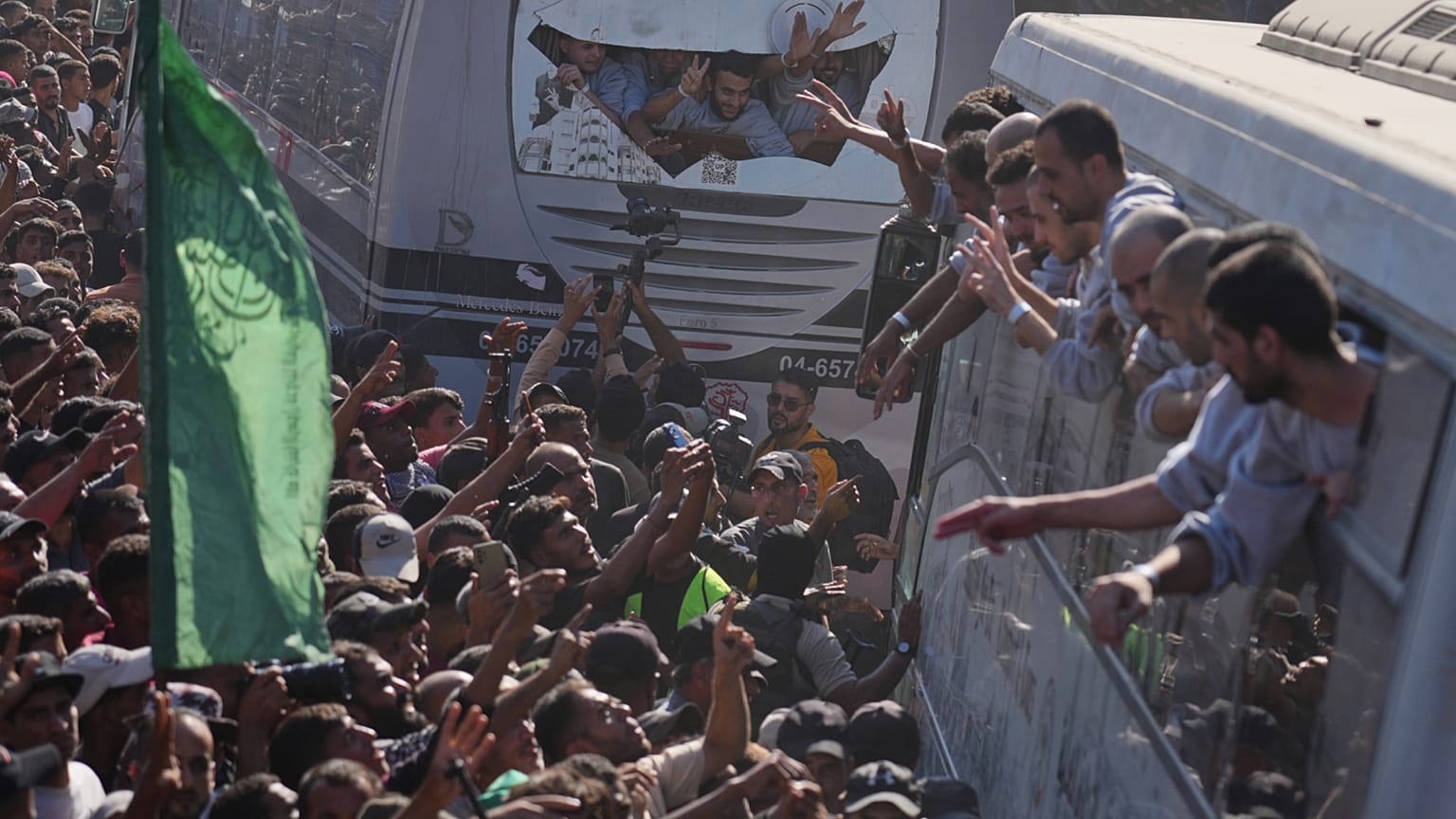The Palestinian Authority officially announced the end of its Martyrs’ Fund in February this year. According to information obtained by Euronews, the mechanism Israel slams as “pay for slay” might still be operating through bypass channels. Brussels insists the EU funds are not involved.
In February, the Palestinian Authority announced the end of the programme to provide payments to families of Palestinians killed or imprisoned by Israel.
Known as the Martyrs’ Fund it guaranteed the Palestinians who are imprisoned by Israel – including those convicted for involvement in terror attacks — monthly “salaries” on a sliding scale depending on sentence length, with an additional stipend for their families, and grants available for things such as health insurance and education.
The programme had been criticised by the US, the EU and Israel as a mechanism “rewarding attacks” against Israel, which universally panned it as “pay for slay”.
Brussels is now requesting clarity from the Palestinian Authority over whether the programme which was said to be terminated is still operational.
Following years of criticism, Palestinian President Mahmoud Abbas’ revoked the old system in early 2025 as a token of goodwill towards the Trump administration and publicly reiterated that it was no longer in place in his remarks to the UN General Assembly in September.
However, Israel claims that the system is still working – and moreover, that it might involve EU funds in payments through “bypass channels”.
The European Commission told Euronews it “profoundly regrets” that payments have been made through the Martyrs’ Fund regardless of its closure.
“We understand that a recent payment has been made to the families of prisoners, based on a previous scheme. We profoundly regret this decision, as this seems to go against prior announcements," the EU executive said in a statement on Tuesday.
"We have asked for clarifications on the issue from the Palestinian Authority,” the statement added.
According to information obtained by Euronews, Israel’s delegation is in Brussels these days to present its evidence that the old “pay for slay” programme is still allegedly in effect and may involve money the 27-member bloc donated for other purposes.
In its comments to Euronews, the Commission denied that EU funds were involved in the recent payments.
Bypass channels of the support programme
Since February when the programme officially ended the Palestinian Authority established a new mechanism called PNEEI - short for the Palestinian National Economic Empowerment Institution.
This new centralised body is responsible for managing Palestinian social aid payments in accordance with international welfare criteria, like income, employment and housing.
If a person’s application fulfils the socio-economic requirements, they get a basic payment of around €500 (1880 new sheqels).
According to information obtained by Euronews, the applicants also receive additional payments on top of that through bypass channels that are not reported or audited.
Same bypass channels are allegedly used for payments to those who have not applied, but are still being paid by various schemes also allegedly using the prisoners’ authority,“providing” their lists and giving them to the PNEEI and all the other channels.
Allegedly, Hamas members are included in the lists “automatically”, despite the Palestinian Authority (PA) denying that its financial support extends to Hamas and Islamic Jihad members.
According to the information obtained by Euronews, families of Palestinians killed or injured in attacks against Israel and Israelis automatically get the basic payment without any need to meet the criteria. This practice has long been seen by Israel as rewarding and incentivising attacks on its country and its citizens.
When it comes to the released prisoners, those who are in Israel or in the Palestinian territories allegedly still get the payment as a “salary”.
At the same time, they are often registered on paper as employees of the PA or its Security Forces, where they can allegedly receive the salary “related to the results of the committed attack”.
The exiled prisoners and those who have to stay abroad allegedly receive payments for housing and rent on top of the monthly “salary”.
Brussels: EU funds for PA not used in 'martyrs payments'
“We can confirm that not a single Euro of EU money has been spent on these contested payments. EU payments are conducted through the PEGASE system with strict ex-ante and ex-post controls,” the Commission said in its reply to Euronews.
PEGASE is the EU’s main financial mechanism for supporting the Palestinian people, particularly through direct financial assistance to the Palestinian Authority.
It provides targeted direct financial support to the population, including salaries and pensions for civil servants and social allowances for vulnerable families.
The system’s ex-ante and ex-post control includes checks and audits of the beneficiaries for their eligibility before payments are authorised, and also follow-up audits to verify that funds reached the intended recipients and were used for authorised purposes.
The European Commission told Euronews that “the EU is the leading actor insisting on reforms of the Palestinian Authority and ensuring that delivery of all funds is thoroughly controlled.”
The European Commission further stated that “the reform of the social welfare system of the Palestinian Authority (PA) has always been key”.
“The ending of the ‘prisoners and martyrs' payment’ is an important part of the reforms, which the Palestinian Authority has committed to. Issuing a decree-law in this direction earlier this year was a step forward and signalled the PA's commitment to implement far-reaching reforms,” the statement said.
“EU support to the PA is linked to its efforts to pursue the reform agenda, including the full implementation of a new Social Protection Law,” the Commission added.
“Its mechanism on cash payments should be based exclusively on needs and vulnerability criteria.”
The EU is the largest provider of external assistance to the Palestinians, with a bilateral allocation of some €1.36 billion between 2021 and 2024.
In April 2025 the EU unveiled a financial aid package of up to €1.6 billion to support the PA and fund projects in the West Bank, Jerusalem and the Gaza Strip.
More than a third of this money, to be provided over two years, will come as direct budget support to the PA and is aimed at improving financial sustainability, democratic governance and services to help the private sector develop.
The aid is conditional on the PA implementing substantial democratic and governance reforms, including an end to Martyrs Fund payments.
What is the Palestinian Authority saying?
Earlier this month, Abbas fired his finance minister, Omar al-Bitar, according to the PA-run news agency Wafa.
While no official reason was provided for his dismissal, al-Bitar is said to have allowed “pay-for-slay” payments to continue after the PA claimed the programme was scrapped in February.
Israeli outlets reported that al-Bitar authorised payments to some Palestinian security prisoners outside the new system that the PA established earlier this year, which conditioned those welfare stipends strictly on financial need, rather than on the length of one’s sentence.
Earlier in November, Israel’s Foreign Minister Gideon Sa'ar commented on the PA finance minister's dismissal, saying the move “will not absolve the dismisser, Mahmoud Abbas, and the PA of their complicity in 'pay-for-slay' and responsibility for the ongoing payments to terrorists and their families.”
Euronews has reached out to the Palestinian Authority for comment.















